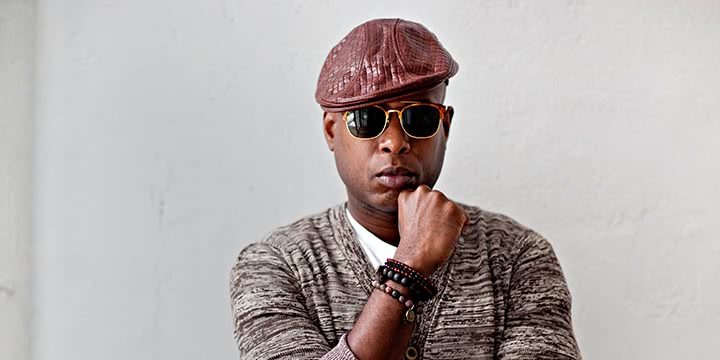Given the social-media-saturated age in which we now live, musicians are faced with a choice.
They can either erect digital walls and retreat from the public eye, or they can speak directly with their fans, bypassing the media and treating the likes of Twitter as though it were a ringing phone waiting to be picked up at whim.
One artist who has wholeheartedly embraced the latter option is American rapper and activist Talib Kweli, the mastermind behind dense, politically motivated albums like Prisoner Of Consciousness and the incendiary Fuck The Money. Not only does he maintain a healthy discourse with his audience via his social media accounts, any fan who buys a record or book available on his website #KweliClub gets rewarded with the email address of the man himself.
“Kweli Club got started up about two years ago,” the New Yorker says, his voice low and thoughtful. “Ryan Leslie, who is an excellent artist and tech guy, came to me with the suggestion that I should do something like that – him and his company, Disruptive Media. He invented it for himself. His company set it up. It’s been a lot of fun. I have emails from all types of people. [They ask about] all different subjects, from world affairs to music.”
Even Kweli’s Twitter feed is jam-packed with strangers asking his opinion on a staggeringly diverse array of matters, from Erykah Badu’s recent comments about young women being responsible for attracting the attention of strangers, to the state of modern rap. And though he appears aware of social media’s shortcomings, occasionally chastising his followers for jumping too quickly onto bandwagons, he nonetheless relishes the opportunity to communicate with fans.
However, despite his copious online discourse, over the phone Kweli chooses his words very carefully. When talk turns to his Australian tour, one he will be conducting with long-time associate Common, he answers in short sentences, turning the conversation into a rapid-fire back and forth.
Is he looking forward to the tour? “Sure. I haven’t been to [Australia] in a long time.” Will he and Common be performing a collaborative set, or two separate ones? “I have no idea. We’ll see when we get there.” Is it fun to perform with someone you know so well? “Yeah, absolutely … Common is a friend.” Is it easier to perform with a friend? “I don’t know if it’s easier, but it’s definitely more familiar.”
Perhaps the most telling reveal of the whole exchange comes when Kweli is asked whether performing live comes to him naturally or not. “It’s natural,” he says. “I perform a lot. I perform like 200 shows a year. I mean, at this point, if it’s not natural to me, I would probably do something else.”
Eventually, conversation moves towards the state of American politics, a topic Kweli frequently discusses. In the past he has spoken out strongly against the United States’ prison-industrial complex, and has organised concerts to memorialise Michael Brown, the African-American 18-year-old shot and killed by a Caucasian police officer. The first question on the subject is a simple one: does Kweli believe that American politics is changing?
“I think that what we’re seeing is the effect of having more information in the world,” he says. “I think that’s having an effect on the entire world. You’re getting more variables when it comes to the political process. Police brutality is in the news now. But I will say one effect, definitely with our election, [is] Donald Trump being such a polarising force. [He’s] someone who is bringing so much entertainment value to the election process – that’s a little historic and different.”
Not that Kweli thinks Trump is a mere entertainer, or an amusing headline – the direct opposite, in fact. “I think Donald Trump is a Frankenstein’s monster who has been created by the more right-wing, more conservative arm of America,” he says. “[More extreme] conservatives are stoking the fears people have after having a black President. When you have a black President you see gun sales go up. You see people expressing racist views more often.
“I think [the success of] Fox News and a lot of the success of the GOP is due to this backlash over having a half-black President,” Kweli continues. “The rise of the Tea Party [a far right American conservative movement] is a big part of that. And Donald Trump is that reality, mixed with being a reality TV star. He’s very popular as a TV entertainment person, and he’s also stoking a lot of fears.”
Not that it’s all bad news, mind you. When asked whether he thinks the cancellation of a recent Trump rally, a moment celebrated by protesters chanting the lyrics of Kendrick Lamar’s ‘Alright’, was a significant event, his voice becomes heavy with conviction. “I would agree with that, definitely.”
Does that mean Kweli believes music can be its own kind of protest, a revolt against hate and bigotry? “Absolutely. That’s been the role of music throughout history. One of the roles.”
No further explanation is really necessary, and Kweli certainly doesn’t give one. After all, his thoughts are already on the record. To glimpse his philosophy in its purest form, one needs only to turn to the track ‘State Of Grace’ and its emotive chorus: “Music is the light when it’s dark”.
[Talib Kweli photo by Dorothy Hong]
Talib Kweli supportsCommon at Enmore Theatre on Monday May 9.


































